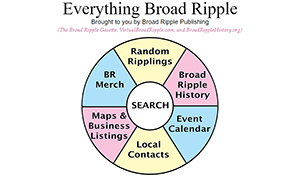
|
Broad Ripple Random Ripplings

The news from Broad Ripple
Brought to you by The Broad Ripple Gazette
(Delivering the news since 2004, every two weeks)

|
| Brought to you by: |

|

|

|

|

|

|
Converted from paper version of the Broad Ripple Gazette (v04n12)
The Word on Real Estate - Advice from a Pro: By Clark Giles
posted: Jun. 15, 2007
Title Insurance: What Is It And Why Do You Need It?
Buying a home is a significant investment. A title insurance policy helps you protect that investment against potential losses that may occur after your house deal closes should you discover that someone else has an ownership claim to the property.
When you buy a home, the title company will conduct a title search (also called a title examination) to determine ownership of the property in question. A title search involves collecting and examining, in detail, all of the public records that involve the title to the property you are purchasing. The search may include past deeds, wills, trusts or other liens against the property to ensure that it has passed properly from owner to owner. The person conducting the search will also attempt to confirm that all previous mortgages and judgments involving the property have been fully paid.
Most times, your title search will come back clear. On occasion, however, a 'cloud' or 'defect' such as a missing signature will be detected, and while the defect is likely the result of an administrative error, it should be cleared before your deal is completed. A thorough title search should also reveal nuisance issues such as easements that may affect your interest in purchasing the property.
Title searches are helpful in identifying any potential title-related issues on your property, but mistakes happen (in the public records themselves, as opposed to just mistakes on the part of your examiner), and you may find yourself involved in a legal battle in the future if a title conflict does come to light after closing. That's where title insurance comes into play: your legal fees will be paid if you are forced to go to court, and if you lose the property as a result of a title dispute, you will be reimbursed up to the limit of your policy.
Similar to other types of insurance, title insurance policies have certain exclusions, so it is important to clarify what your policy covers and what it does not. Some title insurance policies, for example, do not cover, or have limited coverage of problems related to easements, liens or mineral rights. Shop around if you want greater coverage and are willing to pay extra for it. No matter which policy you purchase, defects that occurred after you bought the property are not covered by title insurance.
If you are obtaining a mortgage to finance your house purchase, your lender will likely insist on title insurance coverage to protect its own interests in the event of a title dispute. Your lender may also stipulate additional coverage to guard your portion of the home's value. Policies vary by insurance carrier, but generally, a lender's policy is for the amount of the mortgage and is payable to the lender in the event of a lost dispute while an owner's policy covers the full cost of the property plus legal fees. An issue to consider when purchasing title insurance is whether your policy includes inflation riders that will increase the amount of your coverage as your property value rises. You may pay a premium for this service.
Home buyers are usually responsible for the cost of title insurance, but may defray the charge by including title coverage as a condition of sale or by having the seller's policy adjusted and transferred to the buyer's name. Additionally, some states may require the seller to pay some or all of the title insurance costs, which are typically paid in full as part of your property's closing costs. Ask your legal representative to outline your responsibilities and the seller's responsibilities.

|

|

|
| Brought to you by: |

|

|

|
| Brought to you by: |

|

|

|


